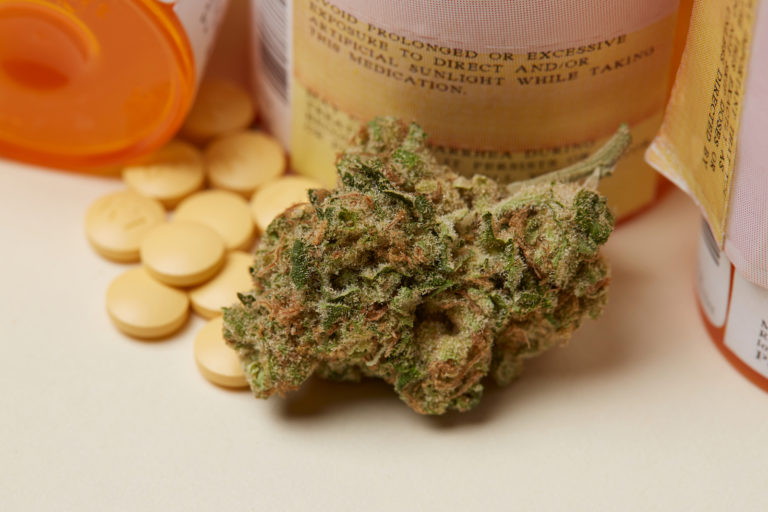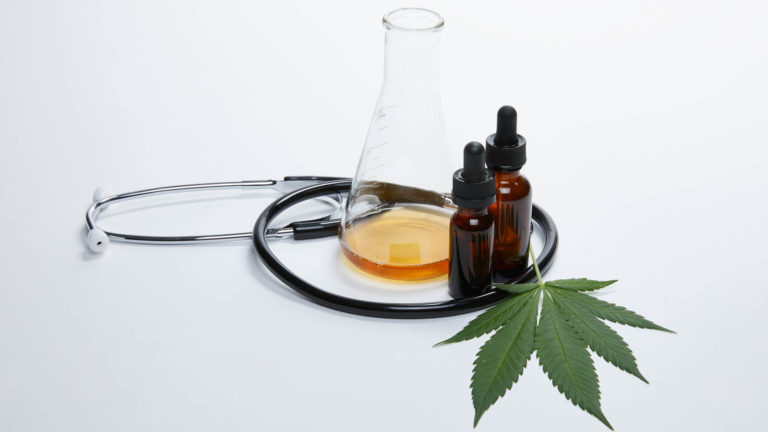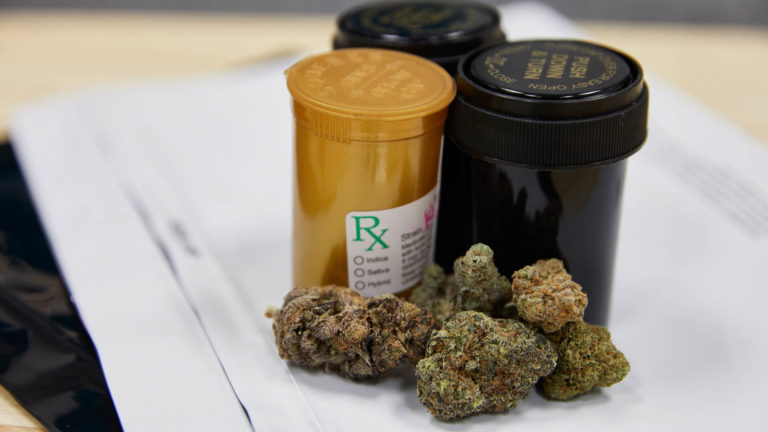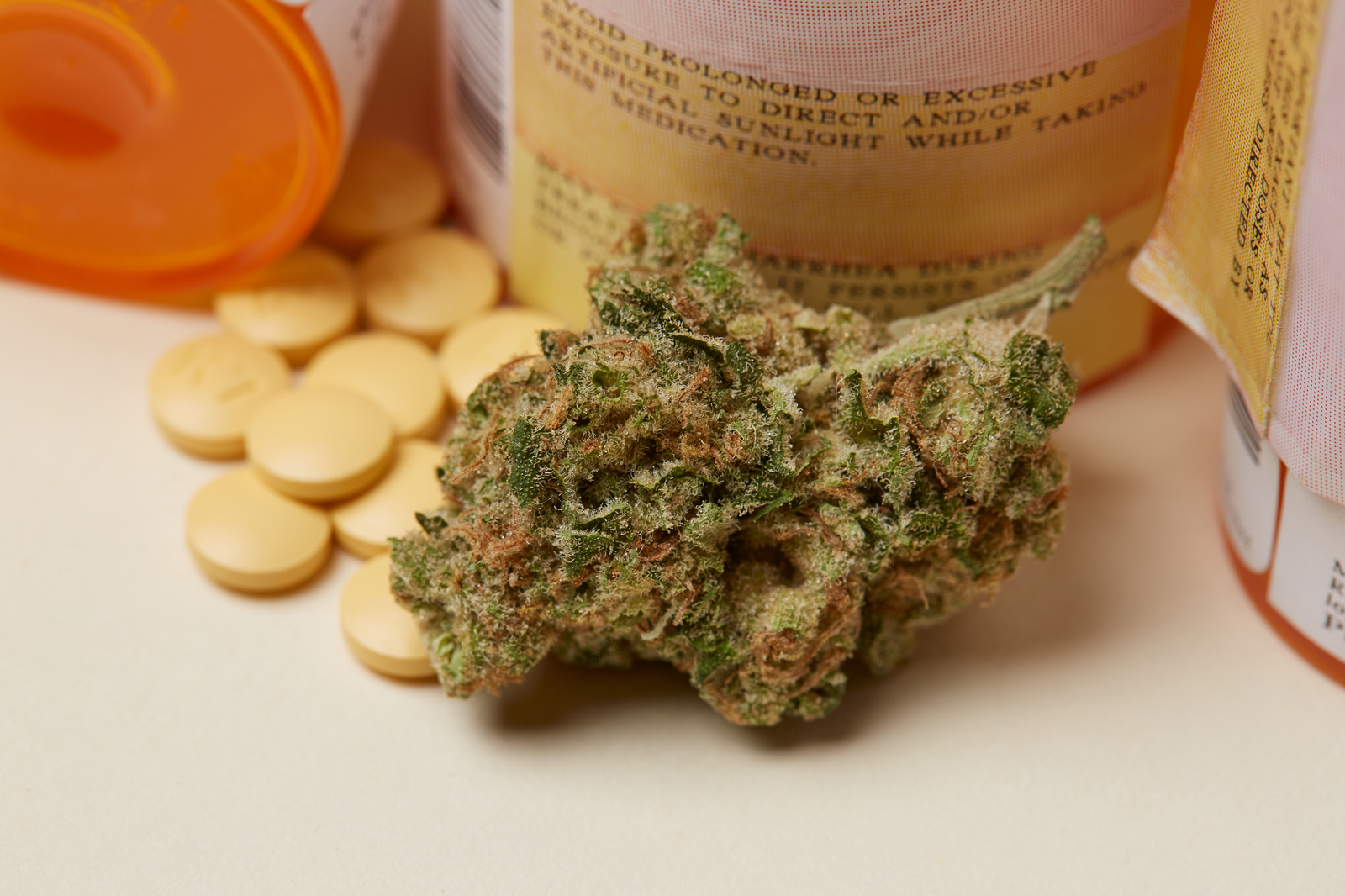Cannabis is a complex plant, with hundreds of chemicals and over 100 distinct cannabinoids. The little research that examines cannabidiol or CBD, the second most common cannabinoid found in cannabis, shows evidence of potential health benefits for a wide range of conditions. As CBD becomes more mainstream, however, a key question comes to mind, "How will CBD interact with my current medication?"
Currently, sparse research suggests that CBD can illicit problematic interactions with certain other prescription drugs. The findings are far from conclusive — further research is still needed on CBD's interaction with different medications. Many doctors and researchers urge individuals using CBD medically or recreationally to be cautious about mixing it with other prescriptions and to consult healthcare providers about possible interactions.

Image lightbox

CBD interaction with drugs & medication
Have you heard of the grapefruit test? Many prescription drugs will include grapefruit warnings on the label, advising against consuming the citrus fruit while taking medication. Many medications are broken down in the liver and small intestine by a group of proteins called cytochrome P450 enzymes (CYPs). This process is what delivers a medication's benefits to the intended target.
Grapefruit disrupts the activity of CYPs and slows the way these proteins usually break down medication. The fruit also increases the side effects and duration the drug stays in the system. One 2013 study titled “Grapefruit Medication Interactions: Forbidden Fruit or Avoidable Consequences?” published in the Canadian Medical Association Journal showed that grapefruit can increase blood content levels when interacting with at least 85 different drugs. The reported consequences were severe, including irregular heartbeat, organ failure, internal bleeding, and death.
Further, a 1993 study conducted by pharmacology researchers at the University of California, San Francisco, and published in the journal Biochemical Pharmacology, discovered that CBD, much like grapefruit, disrupts the normal function of cytochrome P450 enzymes in mice. The study postulated that while the blockage could allow patients to take lower doses of their prescriptions, it could also cause a toxic buildup of chemicals in the body. Since this study's publication, several scientific and medical journals have published evidence of the grapefruit-like effects of CBD in humans.
The type, quality, and purity of CBD administered all affect how it interacts with your body and medication. The timing of when you take CBD and any other prescription drug also factors into how the two may interact in your body. And of course, every individual responds to medications differently, depending on genetics, age, weight, and other factors.
 Photo by: Gina Coleman/Weedmaps
Photo by: Gina Coleman/WeedmapsImage lightbox

Let's examine the current research on CBD's interaction with several common prescription and over-the-counter medications.
Should I take CBD with ibuprofen?
Ibuprofen is a nonsteroidal anti-inflammatory (NSAID) medicine that reduces pain and inflammation in the body. Ibuprofen has a risk of blood-thinning and can cause dizziness, shortness of breath, and nausea.
Potentially, CBD can increase the duration and strength of ibuprofen, thereby increasing the risk of adverse side effects. No human studies to date examine CBD's interaction with NSAIDs specifically. Still, two studies conducted on animal models in 2006 and 2008 and published respectively in the journals, Pain and Pharmacology, suggest that other cannabinoids may work synergistically with NSAIDs like ibuprofen to reduce pain.
Patients should consult with their healthcare provider before taking ibuprofen with CBD.
Should I take CBD with warfarin?
Warfarin, also known under the brand name Coumadin, is an anticoagulant (blood thinner) medication used to prevent the formation of harmful blood clots that could potentially cause heart attacks or strokes. Warfarin's risks include severe bleeding, headaches, swelling, or sudden pain in extremities.
In 2017, researchers at the University of Alabama, Birmingham, conducted a study published in Epilepsy & Behavior Case Reports which showed that CBD increases the effects of drugs used for blood-thinning by slowing down how the body metabolizes warfarin and prolonging its presence in the system. By increasing the duration of warfarin's presence in the body, CBD could potentially exacerbate some of the associated risks.
Patients taking generic warfarin or Coumadin should consult their healthcare provider for individualized information and get blood tests before beginning a CBD regimen.
Should I take CBD with thyroid medication?
Thyroid medication is used to treat thyroid disorders, most commonly hypothyroidism (an underactive thyroid) via thyroid hormone replacement, and hyperthyroidism (an overactive thyroid) via anti-thyroid medication. Different medications achieve these objectives through different pathways in the body. Side effects of thyroid hormone replacement therapies include chest pain, anxiety, headaches, and vomiting. While rare, anti-thyroid medication side effects can include rash, itching, fever, aches, and headaches.
Little research studying interactions between CBD and common thyroid hormone replacement and anti-thyroid medications currently exists. Patients taking thyroid medication who want to try CBD should consult with their physician.
Should I take CBD with Eliquis?
Eliquis (generically called apixaban) is a blood thinner used to lower the risk of stroke or a blood clot in veins, the heart, the lungs, and the legs following knee or hip replacement surgery. Eliquis increases the risk of severe bleeding, and patients taking Eliquis are typically prescribed precise dosages by their doctor.
CYP proteins process Eliquis in the liver, the same proteins on which CBD acts to delay metabolization. This process could cause an overdose of Eliquis' chemicals in the body and a high risk of severe bleeding.
Patients taking Eliquis should speak to their doctor before using CBD products.
Should I take CBD with Plavix?
Plavix is the brand name of the drug clopidogrel, frequently prescribed for patients who have had or are likely to have a heart attack. The drug works by blocking blood platelets from forming clots in arteries near the heart.
According to a 2011 study published in the journal Life Sciences, it is possible that CBD has an inhibitory effect on CYP2C19, the enzyme that metabolizes Plavix. This could cause Plavix to remain longer in the body and weaken its overall effects. Further research is required to determine whether this could lower Plavix's effectiveness in preventing heart attacks.
Patients using Plavix or clopidogrel should consult their physicians as to whether they should use CBD.
Should I take CBD with Tylenol?
Acetaminophen, the generic name for Tylenol, is a common drug used for pain and fever relief. Acetaminophen carries a risk of liver damage and disease, with side effects including nausea, headaches, and insomnia.
Acetaminophen and CBD both are metabolized by CYP450, which lowers the effectiveness of both chemicals as they're processed in the body. One controversial 2019 study, conducted by the University of Arkansas on mice and published in the journal Molecules, claimed that high doses of CBD contributed to liver toxicity, which could compound acetaminophen's liver damage potential. However, the study's authors have been accused of cherry-picking research and designing experiments to showcase potential CBD toxicity. The one study they cited with human test subjects did not show liver toxicity from CBD.
More research is required to confirm potential interactions between CBD and acetaminophen. Patients looking to take both simultaneously should consult their physician.
Should I take CBD with metoprolol?
Metoprolol is a beta-blocker designed to treat high blood pressure by reducing the heart rate and changing the release of epinephrine, a hormone involved in stress and other processes. Beta-blockers lower blood pressure and sometimes produce side effects such as dizziness, nausea, stomach pain, heartburn, and cold hands and feet.
No studies have examined potential interactions between CBD and metoprolol. However, some placebo-controlled research conducted on healthy people at the University of Nottingham in England and published in 2017 in the journal JCI Insight has linked CBD with decreased blood pressure when taken on its own. For patients taking metoprolol, however, the combination with CBD could potentially have negative impacts on blood pressure.
A 2011 study performed on mice and published in the British Journal of Pharmacology also shows that CBD has potential nausea-reducing properties, which may help soothe side effects associated with metoprolol.
Patients taking metoprolol or other beta-blockers should consult their doctor as to whether to consume CBD.
Should I take CBD with metformin?
Metformin is a medication prescribed to adults with type 2 diabetes to help control blood sugar levels. Side effects of metformin include low blood sugar, nausea, diarrhea, vomiting, and muscle pain.
One 2006 study published in the journal Autoimmunity showed that CBD reduced the incidence of diabetes in animal models. To date, however, very little research has specifically covered CBD's potential in human diabetes treatment or interactions with metformin. Only one study, conducted by the American Diabetes Association and published in 2016 in the journal Diabetes Care, has examined the efficacy of CBD in patients with type 2 diabetes and found it had no significant impact on glucose levels.
More research is needed on CBD's interaction with diabetes. Patients taking metformin should talk to their doctor about whether CBD is right for them.
Should I take CBD with Xanax?
Xanax (generic name alprazolam) is a benzodiazepine medication used to treat panic disorders, anxiety, and depression. Common side effects of Xanax include drowsiness, lack of coordination, memory loss, and early-morning anxiety.
Xanax breaks down in the liver via an enzyme called CYP3A4, which is inhibited by CBD. Taking CBD could potentially increase the amount of time Xanax is in the system and prolong or increase the likelihood of unwanted side effects. CBD may one day be considered an alternative to Xanax as various research, including a 2011 study published in the journal Neuropsychopharmacology, has documented the cannabinoid's potential anti-anxiety properties.
No research has explicitly documented interactions between Xanax and CBD. Patients taking Xanax who are interested in CBD should speak to their healthcare providers for more information.
Should I take CBD with statins?
Statins are a classification of drugs designed to lower cholesterol and protect against heart attack and stroke. Common side effects of statins are muscle soreness, blood sugar increase, headaches, and nausea.
Statins are processed by CYP function in the liver, which CBD inhibits. While no research has specifically studied interactions between statins and CBD, the cannabinoid could potentially increase the strength and duration of statins in the system and the risk of unwanted side effects.
Patients taking statins should speak to their healthcare provider before using CBD.
Drugs that should not be taken with CBD
CBD's documented effects on liver function and enzymes that metabolize several medications are relevant when considering whether or not to consume CBD with certain drugs. CBD acts on the same metabolites as grapefruit — therefore, many of the prescription drugs that carry grapefruit warning labels may have similar risks when taken with CBD.
 Photo by: Gina Coleman/Weedmaps
Photo by: Gina Coleman/WeedmapsImage lightbox

These drug classifications include a large percentage of existing prescriptions, such as benzodiazepines, antihistamines, haloperidol, antiretrovirals, statins, cyclosporine, sildenafil, warfarin, and other drugs metabolized by CYP3A4 and CYP2D6.
Clobazam, used to treat epileptic seizures, is another type of drug that may not be advisable to take in conjunction with CBD. However, Epidiolex is an FDA-approved, CBD-based drug that physicians may prescribe to treat epilepsy. A significant amount of data, derived from clinical trials, exists on Epidiolex, although the drug can also cause adverse effects, according to a 2019 study conducted by researchers at Columbia University and published in the journal F1000Research.
No research conclusively warns patients against taking these drugs with CBD, though the previously cited 2013 study published in the Canadian Medical Association Journal has shown that grapefruit and drug interactions can lead to severe effects, including irregular heartbeat and sudden death, kidney failure, and muscle damage. Every patient's case is unique, and individuals should speak to their healthcare providers if they are considering taking CBD in combination with particular prescription medications.
Does CBD oil affect blood pressure?
A previously cited 2017 study titled, “A single dose of cannabidiol reduces blood pressure in healthy volunteers in a randomized crossover study” published in the journal JCI Insight, supports CBD's ability to lower blood pressure. Researchers also suggest that the anxiety- and stress-reducing properties of CBD may contribute to the overall ability to lower blood pressure. However, CBD taken with blood pressure medication or beta-blockers could potentially cause both drugs to double up on each other and lower blood pressure to unhealthy levels.
Does CBD oil thin the blood?
No research shows that CBD oil taken on its own can thin the blood. CBD oil does increase the effects of blood-thinning medications, such as warfarin, and could potentially push the presence of warfarin beyond therapeutic levels, as the previously cited 2017 study published in Epilepsy & Behavior Case Reports showed.
Does caffeine counteract CBD?
Caffeine and CBD are two substances gaining in popularity, particularly when they're mixed. Caffeine can keep sleep-deprived individuals alert and clear-headed. Further, a 2007 study on rats published in the journal Pharmacology Reports showed that caffeine is metabolized by CYP enzymes, which CBD inhibits. This could extend the time caffeine stays in the body and has the potential to extend the stimulating effects of caffeine.
The information in this article is based on current research and should not be construed as medical advice. Please speak to your doctor or healthcare provider if you have questions regarding your medication and CBD use.
Major contributions from Dr. Adie Rae.

